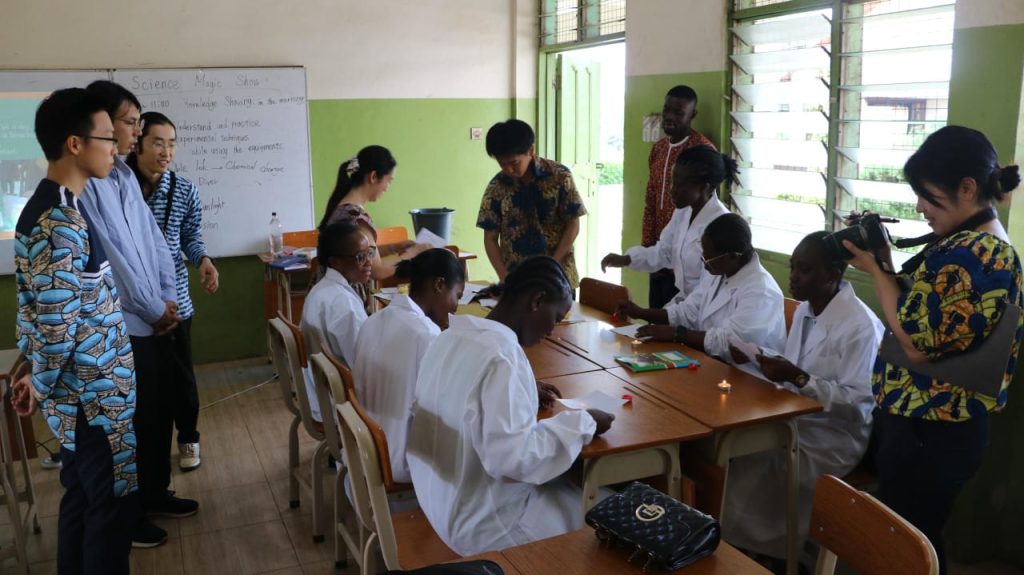Japanese volunteers serving in various Ghanaian schools under the Japan International Cooperation Agency’s (JICA’s) Japan Overseas Cooperation Volunteers (JOCV) program, organised a Science Magic Show on 24th and 25th June 2024. Tutors at the St. Louis College of Education and students of the Old Tafo M/A Basic School in Kumasi, were treated to series of educative and captivating science experiments during the Show in Kumasi.
Five distinctive science experiments were performed under the Science Magic Show. They include: Focusing Sunlight (Solar energy converted into heat), Invisible Ink (Chemical changes occurred by heating), Cartesian Diver (Buoyancy and pressure in fluids), Dust Explosion (Air/oxygen supports burning of materials) and Plastic Bottle Water Rocket (Newton’s Third Law of motion/ forces in equal but opposite direction).
Among other objectives, the Show sought to improve science education by introducing new and easy methodologies to conduct experiments that will stimulate children’s interest and intellectual curiosity and motivate them to study more about science. The Show provided teacher trainees from the College of Education and the teachers from basic school with hands-on experience of creating teaching materials and improving their teaching abilities.
One of the facilitators, Mr. Yusuke Kuwana, a primary school teacher from Japan, serving as a JICA volunteer in the Volta Region said: “I teach Science and English in Japan. When I was deployed to Ghana, I was nervous because of the language barrier. However, when I started teaching, I realized the importance of practical experiments, through which my students and colleague teachers participate and learn new ways of conducting science experiments”. “In today’s magic show, it was a good opportunity to share my experience with teachers and students from another region in Ghana. I was also happy to see the excited pupils. To them, this is possibly the first to see a “bottle water Rocket”, it’s a simple thing, but they did not know. Now, they will know that science is everyday practice and can apply what they learn in theory”, he added.
The words of Ms. Miyako Yamada, another volunteer assigned to St. Louis College of Education expressed her excitement on the active participation and outcome of the Show. “I am happy this program was successful today. In Japan, I teach science in Junior High School, in Ghana, I support science classes with focus on practical experiment using locally available resources at the College of Education. I am particularly excited because my experience was accepted by my counterparts and student trainees who would become licensed teacher someday. When we started this Magic Show, I could see the excitement in the pupils and teachers, which means these experiments are important. My colleagues and I would continue to support the teaching and learning of practical science to students and counterparts in our assignment place.”
Kuwana and Yamada led the team of Japanese volunteers teaching science and mathematics in various Ghanaian schools to organize the “Science Magic Show”. They said they were motivated to demonstrate easy ways of conducting science experiments to Ghanaian teachers and students, using every-day and easy-to-find materials that are locally available at very low cost, offering an opportunity to increase science experiment lessons in schools without spending a lot of money.
The Science Magic Show was held in two days. On the first day, the team organised a Professional Learning Community (PLC) workshop involving 8 students trainees of the St. Louis College of Education and teachers of Old Tafo M/A Basic School to introduce the contents and prepare them as “Co-facilitators” to support carryout the experiments. On the second day, they performed the science experiments in front of hundreds of students at the Old Tafo Basic School.
Students of the Old Tafo Basic School were elated and wished they had more of the science experiments. When asked in some of their various classrooms, majority of them said it was their first time to have Japanese teachers demonstrate science experiments to them. Others said they would compel their parents to get them some of the materials needed, so they can replicate the science experiments at home and show their families what they learnt. They said their interest in science has been renewed.
The Head Teacher of the Old Tafo M/A Basic School, Comfort Birago expressed gratitude to JICA and the Volunteers: “I am very happy and grateful that our school was chosen for the Science Magic Show. This is one of the few times such extensive and highly practical science experiments is being performed here. I believe my students will always remember this experience and for some, I know it has sparked the love for science in them. Now, we know these experiments could be easily replicated using affordable materials we find around us.”
Yasmine Mohammed, a student of the St. Louis College of Education, said: “When I heard that there would be a Science Magic Show at Old Tafo Basic School, I was happy. I know the school is deprived and the science experiments would mean a lot to them. I decided to come and help in coordinating the Show and to also learn how to replicate the experiments to my students when I graduate from the College of Education. Our standard of teaching and learning science will continue to improve with the assistance of these wonderful Japanese teachers.”
Christiana Dabanka, one of the seasoned teachers at the St. Louis College of Education, was instrumental to the success of the Science Magic Show. She noted that, “The synergy between the volunteers, myself and the entire school, is exemplary. I have taught science for many years, but I am happy I got the opportunity to explore new ways to teach these experiments and impart more knowledge to my students. I am grateful to JICA and all the volunteers for this unique experience. I believe we will keep working together to improve the teaching and learning of science education in Ghana.”
